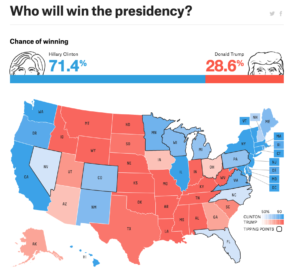
http://projects.fivethirtyeight.com/2016-election-forecast/
I’m actually surprised to say that I am looking forward to watching the polls come in tonight, finally concluding this brutal and depressing presidential election season. It’s partially because I’m looking forward to drinking and eating with good friends and because I believe that Hillary Clinton is going to with the election (Nate Silver, as of 1:12pm ET today, has her at 71%). But also, it’s because I am fascinated and slightly terrified about what’s going to come next. How will Trump respond to a resounding electoral rebuke of his racist, sexist, demagogic campaign?
Trump is a uniquely terrible, but his popularity and rise to significant power is a fundamentally sociological phenomenon. My guess is that there will be many academic attempts (not just journalist long-form pieces) to try understand the rise of Trump coming from history, sociology, political science, and psychology.
I recently stumbled upon a piece by Arlie Hochschild, “The Ecstatic Edge of Politics: Sociology and Donald Trump” that I thought was enlightening. Hochschild is also the author of the recent book, “Strangers in their Own Land: Anger and Mourning in the American Right”, which is an ethnographic account of the political understanding, culture, and emotional meaning making of Tea Party supporters in the American South. She is well placed to create a sociological take on the rise of Tumpism.
She says that thinking on Trump to date is insufficient to truly account for his rise and to explain his supporters’ praise. She shows the utility of Hofstadter’s view of paranoia as a source of charismatic leadership, Skocpol and Williams’ institutional approach to understanding the organizational rise of the Tea Party movement, and Lakoff’s politics as metaphor in understanding components of Trump’s rise. But alone, they are still insufficient to understand this phenomenon. Additionally, we need to understand the “deep story” that unites the shared cultural understanding of Trump supporters across the country.
For her, a “deep story” is “a metaphor-based narrative, the details of which corresponded to the emotions experienced by my informants. A deep story is a feels-as-if story—stripped of facts and moral judgment.” A story that the Trump supporters / the far right seem to share:
You are standing in a long line leading up a hill, as in a pilgrimage, patient but weary. You are in the middle of this line, along with others who are also white, older, Christian, native-born, and predominantly male, some with college degrees, some not. At the crest of the hill is the American Dream, the goal of everyone waiting in line, a standard of living higher than that your parents enjoyed. Many behind you in line are people of color—poor, young and old, mainly without college degrees. You wish them well, but your attention is trained on those ahead of you. And now you notice the line isn’t moving. In fact, is it moving backward?
You’ve suffered. You’ve had marriage prob- lems, and you are helping out a troubled sibling and an ill co-worker. Your church has seen you through hard times. You’ve shown strong character, and the American Dream is a badge of moral honor, as you see it, for that.
But look! Some people are coming from behind and cutting in line ahead of you! As they cut in, you are being moved back. How can they just do that? You’re follow- ing the rules. They aren’t. Who are they? They are black. They are brown. They are career-driven women, helped by Affirmative Action programs.
The liberal government wants you to believe they have a right to cut ahead. You’ve heard stories of oppressed blacks, dominated women, weary immigrants, closeted gays, desperate Syrian refugees. But at some point, you say to yourself, we have to build a wall against more sympathy. You feel like a refugee yourself.
You’re a compassionate person. But now you’ve been asked to extend your sympathy to all the people who have cut in line ahead of you. And who’s supervising the line? It’s a black man whose middle name is Hussein.
He’s waving the line cutters on. He’s on their side. He’s their president, not yours. What’s more, all the many things the federal government does to help them don’t help you. Should the government really help anyone? Beyond that, from ahead in line, you hear people calling you insulting names: ‘‘Crazy redneck!’’ ‘‘White trash!’’ ‘‘Ignorant southern Bible-thumper!’’ You don’t recognize yourself in how others see you. You are a stranger in your own land. Who recognizes this?
This feels right to me. Trump’s rise isn’t just about sexism, economics failings, or pure racial resentment — though of course all of these are present. Its really about a narrative / meaning making process that is rooted in shared experiences and built upon a particular understanding of a violated sense of fairness. Trump is unique in the fact that he has found a way, better than anyone else to date, to validate and channel this narrative.
Now, what political action and response is needed? Probably one rooted in trying to listen and understand the pain and struggles of real people. As Hochschild concluded, “Whether Donald Trump rises or falls, we need sociology to take up the task of analyzing the rise of the right. And we need our government and society at large to address all the ways millions of American have been—in real life—left behind.”